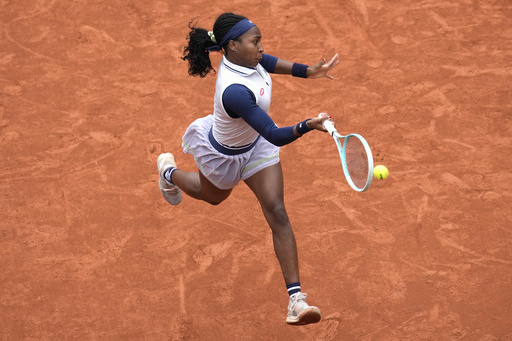PARIS (AP) — When Coco Gauff’s opponent at the French Open on Friday, 30th-seeded Dayana Yastremska, returned to the locker room in Court Philippe Chatrier, she pulled out her phone to study video clips of her 6-2, 6-4 loss to the American.
“I just was really curious what I did wrong,” explained Yastremska, a semifinalist at the Australian Open in January.
Watching the third-round match back, the Ukrainian realized she repeatedly made the mistake of trying to go for too much and end points too early. She acknowledged that she allowed her concentration to waver for various reasons — the wind gusting at up to 25 mph (40 kph), the dismay at barely missing some shots, the way balls kept coming back over the net from the third-seeded Gauff.
To be sure, there were ways in which Gauff, the reigning U.S. Open champion, could have been distracted, too, especially while letting a 5-2 lead in the second set slip away so much that, on three occasions, the score was a single point from 5-all.
“It was a little bit difficult, I think mentally, to stay focused and not got too mad,” Gauff said, “but I’m glad that I was able to push through.”
Ah, that skill of remaining in the moment is as much of a strength of Gauff’s game as her first serve, which reached 124 mph (200 kph) on Friday, and her speed, instincts and defense, which allowed her to win on a day she only accumulated eight of her 75 total points via winners.
So where does her focus come from?
Gauff chalks it up, at least in part, to breathing exercises she does every so often.
“I like to lay on the ground and just meditate, whether it’s for literally a minute or two or 10 or 15. It just kind of depends on the day or how I feel,” she said. “I think it helps to keep you grounded, because sometimes in these tournaments, the pressure can feel like a lot to do a lot. Sometimes, you just lay on the ground, and you just think that … there’s billions of people on this earth, and billions of people don’t even know who you are. So the matches aren’t as big as they feel sometimes.”
Her father, Corey, chalks it up to this: “Looking at how great people deal with pressure situations.”
One example: late Los Angeles Lakers star Kobe Bryant.
“She loves Kobe Bryant. He left a long list of lessons, (such as), ‘Always focus on the craft.’ They asked Kobe: ‘Do you love winning or do you hate losing?’ And he said he loved to figure things out,” Dad said. “If you approach sports that way, you find more enjoyment in it.”
There can be those challenges within a match, to be sure.
Away from the court, too, of course, including dealing with personal and outside expectations placed on someone who is still just 20 years old yet already owns one Grand Slam title, was the runner-up at another major (the 2022 French Open) and has been in the spotlight for a quarter of her life.
Her parents help provide perspective.
“This would have been the end of her sophomore year of college,” Corey Gauff said. “She’s mature now, so she’s starting to educate herself on a lot of things. And, with all the things that are going on in life and in the world, just being more appreciative of the opportunity to be on the court. If you stick to that, and treat the sport like it’s a privilege to even be out there, then you get less mad about it and get less upset. I’ve never seen a champion with a bad attitude.”
In the fourth round on Sunday, his daughter will face unseeded Elisabetta Cocciaretto, an unseeded Italian who owns three victories against foes ranked in the top 20 — and all three came at the French Open. Two were during this upset-filled week, with Friday’s 7-6 (4), 6-2 victory over No. 17 seed Liudmila Samsonova following a first-round win against No. 13 seed Beatriz Haddad Maia.
The 51st-ranked Cocciaretto never has been to the fourth round at a major before.
So what’s her approach to taking on Gauff, who has won both previous head-to-head matchups?
“Pressure doesn’t affect me. I don’t feel the weight of trying to prove anything to anybody else — just myself, my coach, my parents. And that’s it,” Cocciaretto said. “I need to be aggressive. I need to surprise her. I need to have a good attitude. And not be afraid.”
___
Howard Fendrich has been the AP’s tennis writer since 2002. Find his stories here: https://apnews.com/author/howard-fendrich
___
AP tennis: https://apnews.com/hub/tennis


